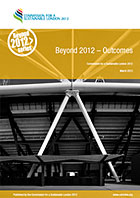
Last week, the two ends of the Earth could not have been further apart, metaphorically at least. For a long moment, the world’s eyes turned towards the Rio +20 Earth Summit to witness what most hoped would result in a concrete agreement to preserve the planet’s future. In stark contrast to the gloom surrounding low ambitions expressed at Rio, the excitement is building at the other end of the globe as we head into the home strait for the largest festival on the planet – the London 2012 Olympic and Paralympic Games.
The paradox has not escaped the Commission. Indeed, we have always maintained that the only way in which London 2012′s extravaganza could possibly be considered sustainable is for there to be a lasting benefit to the UK. The Commission’s Beyond 2012 initiative will make a significant contribution to the sustainable legacy of the Games. There is no doubt that the environmental impact of staging an event such as the Games is enormous, despite the significant work London 2012 has done to reduce impacts wherever they can. The benefits to be delivered from the Games are also immense, both tangible and those less able to be measured. These benefits are, for our money, where the key lies to understanding the extent to which the Games are contributing towards a more sustainable world.
One of the ways we feel we can help tip the balance in the right direction is to make sure that the issues for which there has been no easy answer are given the airtime they deserve once the Games are over. These are complex: they are not solved through a single stroke of a pen, but they matter. How, for example, can future Games go right to the heart of labour standards issues from the outset – pushing the Industry to go further than they have before? What more can be done to learn from the excellent work of LOCOG in providing sustainable, healthy food at future major events?
With Rio+20 now wound up, the Commission believes there is a responsibility to think about the wider international impact of the London Olympic and Paralympic Games. By doing so, it is possible to ensure that the work and approaches taken in London can be used to promote and foster new thinking.
This is why we have announced that we will be running a series of roundtable discussions entitled Beyond 2012 to take forward the sustainability lessons from the London Olympic and Paralympic Games. The roundtables, which will take place in late 2012 and early 2013, are intended to unlock new thinking and challenge established views around sustainability. Output from the series will benefit large corporations, major global event planners and governing authorities.
Each roundtable will be professionally facilitated and will focus on one topic. Areas include transport, construction and infrastructure, supply chain, food, sponsorship, legacy, events and assurance. To ensure that each roundtable provides valuable and actionable insights, the Commission will be inviting expert individuals from a range of backgrounds and organisations to have an open and honest conversation.
Shaun McCarthy, Chair, Commission for a Sustainable London 2012 said: ‘The objective of this series is to have an honest conversation about where London excelled and where things could have been done better. We want to break down the barriers and polarisation that can often influence much of the sustainability agenda and instead take a more collaborative approach to advance sustainability thinking in the years ahead.
‘London 2012 demonstrates what can be done when sustainability is embedded in a systemic way in early planning. However, we cannot ignore the fact that this is the first time this type of holistic lifecycle approach has ever been attempted on this scale and naturally some initiatives did not work as planned. This is why this initiative is so important for us to learn from both the good and the not so good.’
Insights gathered from the Beyond 2012 series will be compiled into a publicly available report detailing key recommendations, case studies and areas for further consideration.
